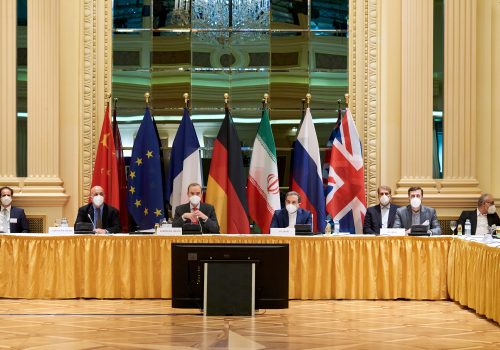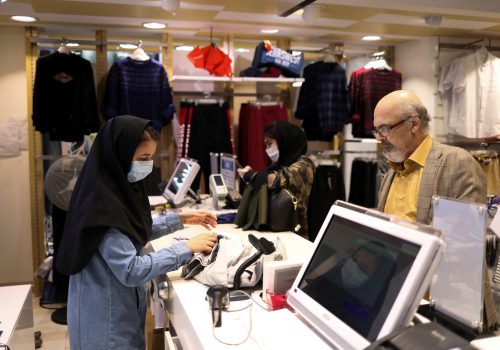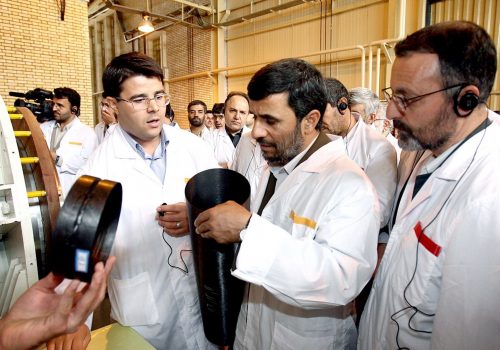More questions than answers about Iran’s nuclear intentions
If negotiations aimed at reviving the Joint Comprehensive Plan of Action (JCPOA) nuclear talks fail and economic sanctions on Iran remain in place, would Tehran seek to field nuclear weapons? Is eventual nuclear weaponization an Iranian objective even if the JCPOA comes back into full effect? Or is it true, as some Iranian officials—even the Supreme Leader—have claimed, that Iran has no interest in becoming a nuclear weapons power?
These questions may not be easily answerable, even for American intelligence analysts doing their best to inform policymakers. Iranian officials themselves may not know the final answers. Or perhaps they do. As I’ve reported previously, track two discussions with senior Iranian academics and former officials held in Copenhagen between 2013 and 2015 produced an interesting, if not authoritative clue.
In a long conversation centering on the prospects and prerequisites for a nuclear deal, the Iranian team argued that developing and deploying nuclear weapons would be contrary to Iran’s interests. Iran, they pointed out, had made tremendous political-military progress in places like Lebanon, Iraq, and Syria without nuclear weapons. If Iran went nuclear, they argued, so would everyone else in the neighborhood. Nuclear proliferation would thus make every Iranian regional foray a potential nuclear crisis. This, they noted, would be operationally crippling. One Iranian even downplayed the importance of Supreme Leader Ayatollah Ali Khamenei’s fatwa against nuclear weapons, saying it was much less a matter of theology than it was manifestly in the national interests of Iran to rely exclusively on non-nuclear means for power projection.
When my Iranian interlocutors argued that the Islamic Republic would be operationally handicapped by nuclear weapons in a region where proliferation would become an inhibiting norm, I asked them why there were nuclear negotiations. If going nuclear was policy poison, why not just stop the enrichment, centrifuges, and all the rest? Why not just agree to an intrusive United Nations inspection regime?
The response was instant: Iran’s goal is to get out from under US sanctions. Tehran, in other words, wanted to be paid to act in its interests.
One likely scenario, therefore, would be for a moribund JCPOA and sustained sanctions to motivate increased uranium enrichment to the point where Iran reduces its weaponization breakout time to what it was before the JCPOA pushed it back. No doubt Tehran believes that the threat of it going nuclear is the principal anti-sanctions blackmail weapon in its arsenal. But what if that weapon fails? Would Iran react by moving to become a nuclear weapons power?
Commentators who perceive major differences between Iranian “hardliners” and “moderates” often volunteer the warning that the election of a “hardliner” to the Iranian presidency would tilt the country toward nuclear weaponry. This warning is sometimes accompanied by another: The US should avoid acting harshly toward Tehran lest a hardliner be elected.
Without discounting the fact that Iran has politics and politicians displaying varying degrees of pragmatism versus dogma, one should not ignore the decisive power of the Supreme Leader—power that is close to absolute irrespective of who fills the presidency. During the Iran-Contra days in the mid-1980s, the Ronald Reagan administration faced withering criticism for putting stock operationally in the “hardliner” versus “moderate” dichotomy. Over three decades later, prominent Iranian “moderates” often dispatched to meet informally with Americans have no qualms at all in upholding and celebrating Tehran’s advances in Lebanon, Syria, Iraq, and Yemen—advances that have helped wreck countries and terrorize their inhabitants.
The just-released 2021 Annual Threat Assessment of the US Intelligence Community is silent on this issue of supposed significant policy differences—as opposed to differing methodological approaches—among supporters of clerical rule. It is also silent on the question of whether Iran intends to field nuclear weapons under any circumstances—short, perhaps, of a perceived imminent regime change threat. Naturally, the old intelligence truism applies here: One may reliably and objectively measure capabilities, but not intentions. Still, estimating intent is the obligatory heavy intellectual lifting required of useful intelligence analysis; estimates that policymakers ideally read and reflect upon.
If, for example, the American intelligence community estimates that Iran will likely not go militarily nuclear short a perceived imminent regime change threat, then what would be the point of pressing to restore a nuclear accord that would unlock vital funding for violently destabilizing Iranian operations in the Middle East and beyond? Might it be better and potentially more productive to focus instead on those operations and on sanctions relief contingent on changes? True, some observers assure us that Iran only reacts to the initiatives of others in the region. But is militant group Hezbollah’s imprisonment of Lebanon a defensive operation? Is Iranian support of Bashar al-Assad’s war crimes in Syria an exercise in Iranian self-defense?
Indeed, the 2021 Annual Threat Assessment, while acknowledging that Iran sees itself locked in a struggle with the US and feeling threatened, does not portray the clerical regime as acting defensively. It specifies that:
- “Iran will remain a problematic actor in Iraq.”
- “Iran is determined to maintain influence in Syria.”
- “Iran will remain a destabilizing force in Yemen.”
- “Tehran remains a threat to Israel, both directly through its missile forces and indirectly through its support of [Hezbollah] and other terrorist groups.”
- “Iran will hedge its bets in Afghanistan, and its actions may threaten instability.”
In sum, Iran “will continue to pose a threat to US and allied interests in the region for the foreseeable future.”
Does the intelligence community now assess—as President Barack Obama once hoped—that a nuclear deal with Iran would ultimately change Tehran’s regional behavior for the better and perhaps even mitigate violent, corrupt rule within Iran itself? Does it assess that Iran intends to field nuclear warheads if the JCPOA is not revived and sanctions relief not forthcoming?
A recent article by the Brooking Institution’s Paul R. Pillar in The National Interest makes an interesting central point: “We know that Iran has had an interest in nuclear weapons, given some weapons design work that was ongoing some twenty years ago. Then during the decade of the aughts, that work stopped and Iran made diplomatic overtures to the United States about constraining its nuclear activities in return for sanctions relief. The only plausible interpretation of that development and of the Iranian actions that followed is that Iranian leaders calculated that it was better to be non-nuclear-weapon state fully integrated into the international community and global economy than to be a nuclear-armed but heavily sanctioned pariah.” Yet is it possible or even probable that a regionally aggressive Iran could remain a heavily sanctioned but non-nuclear pariah?
Pillar was responding to an essay arguing, inaccurately in his view, that Iran would use sanctions relief derived from a renewed JCPOA to build a prosperous economy that would finance the eventual production of nuclear weapons. Yet, in countering that argument, Pillar opened the door to an interesting question: Does the preservation and perpetuation of Iran’s non-nuclear military status depend on renewing the JCPOA and removing sanctions?
Israel takes the view, perhaps based on sound intelligence, that Tehran is determined ultimately to mount nuclear warheads atop ballistic missiles; that the JCPOA gave Iran and may again give the country a gold-plated pathway to that end. Indeed, during my abortive Israel-Syria peace mediation over a decade ago, Prime Minister Benjamin Netanyahu told me more than once there would be no prospect for peace with anyone—especially with Syria—if Iran succeeded in going nuclear. Everyone, according to Netanyahu, would go with the “winner:” Iran.
Nevertheless, is it conceivable that Iran’s modus operandi in the Arab world—whether it is aggressive or, as Pillar and others would argue, merely reactive to the moves of others—obliges it to remain non-nuclear? Would the resurrection of the nuclear accord amount to paying Iran not to do what it does not wish to do anyway?
I don’t purport to have authoritative answers. One hopes the nuclear diplomacy of the Joe Biden administration is informed and guided by intelligence analysis indicating that the US is not in danger of inadvertently paying Tehran not to develop a weapon it does find in its interests to develop in any event—that a renewed JCPOA will not enable Iran to do its absolute worst in the Middle East. The consequences of getting this wrong would be deadly indeed for American regional interests, especially for innocent civilians struggling to survive in countries experiencing the malignant presence of Iran and its proxies.
Ambassador Frederic C. Hof is Bard College’s Diplomat in Residence.
Image: Iranian President Hassan Rouhani reviews Iran's new nuclear achievements during Iran's National Nuclear Energy Day in Tehran, Iran April 10, 2021. Iranian Presidency Office/WANA (West Asia News Agency)/Handout via REUTERS


